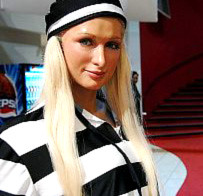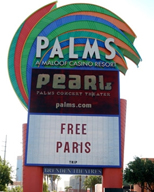There is plenty of commentary out there about Paris Hilton responding to a John McCain advertisement that called Barack Obama "the biggest celebrity in the world" over Hilton and Britney Spears.
In fact, there is enough buzz that some people are wondering if anything might be gleaned from the original ill-advised commercial that takes a cola vs. cola contrast and turns itself into a cola vs. soda pop uncertainty.
The initial ad and post communication fall flat.
Sure, the McCain advertisement only flashed Spears and Hilton in the opening shots. But considering Kathy Hilton was a McCain campaign contributor, his continued references to the Hilton daughter were bound to backfire.
"It is a complete waste of the money John McCain's contributors have donated to his campaign. It is a complete waste of the country's time and attention at the very moment when millions of people are losing their homes and their jobs. And it is a completely frivolous way to choose the next President of the United States." — Kathy Hilton
Initially, McCain aides said there was no sinister intent. But then campaign manager Rick Davis gave reporters a sound bite that demonstrates the opposite.
“Look, it is the most entertaining thing I have seen on TV in a while … I don't know Paris Hilton and Britney Spears but they are international celebrities, so, you know, apples to apples."
Exactly. The campaign was attempting to draw a parallel between Hilton, Spears, and Obama while demonstrating that the McCain campaign is up to speed on celebrity pop culture. We got it.
Except, they aren’t up to speed. Until the McCain comments, Spears and Hilton were still recovering from some self-inflicted brand damage. Now, it seems the advertisement gave at least one of them a lift.
Hilton’s best branding message has always been that she can handily dismiss most critics. She does exactly that in her rebuttal, and then goes a bit further by demonstrating that she can sound just as serious about energy as any presidential contender. So what can the McCain team say now? Nothing.
Keep the focus on one choice and steer clear of other sodas.
Maybe someone needs to remind the McCain campaign team that Paris Hilton is not the opponent. So as good as the comparison could have been for an in-house chuckle, the execution came across like a gym room joke gone wrong. Yep. Sometimes campaign team muses are better left behind closed doors.
What is even more surprising to me is how often it comes up. Last year, Hillary Clinton tried to take a shot a Gen. David Petraeus and it backfired. John Edwards’ campaign was slowed when his opponents became staff members. And Mitt Romney, whom I liked, lost some momentum after taking on an Associated Press reporter.
Locally, it’s the same story. Assemblywoman Francis Allen, who told the press that she would not comment on her most recent scandal, is now attempting to discredit her husband with voters. She sent residents a note that states ...
“I have decided to file for divorce because of my husband’s recent unstable, even volatile, behavior.”
Attempting to target her husband, who recanted his police report after learning Allen would be arrested, certainly wasn’t the answer. If anything, Allen’s risking a libel suit while reinforcing some heavy spin on a story that not all residents knew nor really cared about. With three other challengers poised to unseat her, it doesn’t make sense.
Hmmm … maybe that’s why when Coke and Pepsi were heavily engaged in brand wars, they tended to pair themselves up against each other and not every other soda pop on the planet. Right on. One cola was enough. It's the same in politics: know your opponent.

In fact, there is enough buzz that some people are wondering if anything might be gleaned from the original ill-advised commercial that takes a cola vs. cola contrast and turns itself into a cola vs. soda pop uncertainty.
The initial ad and post communication fall flat.
Sure, the McCain advertisement only flashed Spears and Hilton in the opening shots. But considering Kathy Hilton was a McCain campaign contributor, his continued references to the Hilton daughter were bound to backfire.
"It is a complete waste of the money John McCain's contributors have donated to his campaign. It is a complete waste of the country's time and attention at the very moment when millions of people are losing their homes and their jobs. And it is a completely frivolous way to choose the next President of the United States." — Kathy Hilton
Initially, McCain aides said there was no sinister intent. But then campaign manager Rick Davis gave reporters a sound bite that demonstrates the opposite.
“Look, it is the most entertaining thing I have seen on TV in a while … I don't know Paris Hilton and Britney Spears but they are international celebrities, so, you know, apples to apples."
Exactly. The campaign was attempting to draw a parallel between Hilton, Spears, and Obama while demonstrating that the McCain campaign is up to speed on celebrity pop culture. We got it.
Except, they aren’t up to speed. Until the McCain comments, Spears and Hilton were still recovering from some self-inflicted brand damage. Now, it seems the advertisement gave at least one of them a lift.
Hilton’s best branding message has always been that she can handily dismiss most critics. She does exactly that in her rebuttal, and then goes a bit further by demonstrating that she can sound just as serious about energy as any presidential contender. So what can the McCain team say now? Nothing.
Keep the focus on one choice and steer clear of other sodas.
Maybe someone needs to remind the McCain campaign team that Paris Hilton is not the opponent. So as good as the comparison could have been for an in-house chuckle, the execution came across like a gym room joke gone wrong. Yep. Sometimes campaign team muses are better left behind closed doors.
What is even more surprising to me is how often it comes up. Last year, Hillary Clinton tried to take a shot a Gen. David Petraeus and it backfired. John Edwards’ campaign was slowed when his opponents became staff members. And Mitt Romney, whom I liked, lost some momentum after taking on an Associated Press reporter.
Locally, it’s the same story. Assemblywoman Francis Allen, who told the press that she would not comment on her most recent scandal, is now attempting to discredit her husband with voters. She sent residents a note that states ...
“I have decided to file for divorce because of my husband’s recent unstable, even volatile, behavior.”
Attempting to target her husband, who recanted his police report after learning Allen would be arrested, certainly wasn’t the answer. If anything, Allen’s risking a libel suit while reinforcing some heavy spin on a story that not all residents knew nor really cared about. With three other challengers poised to unseat her, it doesn’t make sense.
Hmmm … maybe that’s why when Coke and Pepsi were heavily engaged in brand wars, they tended to pair themselves up against each other and not every other soda pop on the planet. Right on. One cola was enough. It's the same in politics: know your opponent.


















